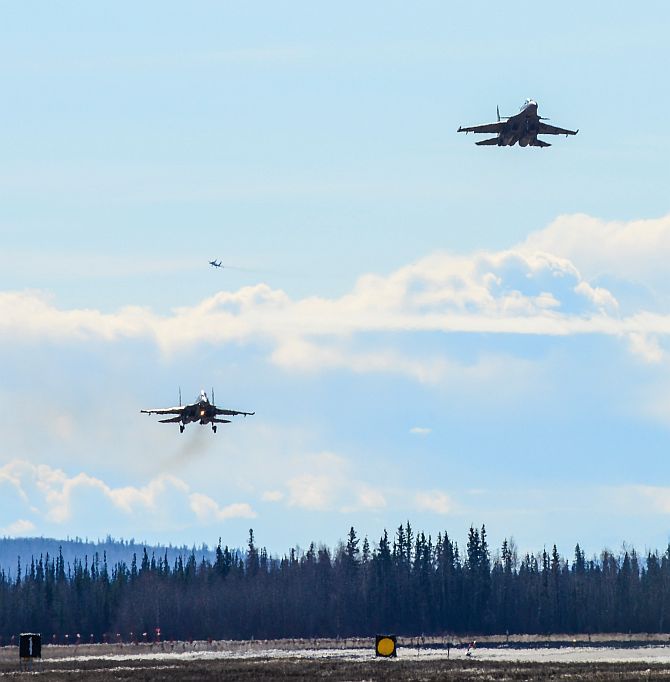The US has told Pakistan this week it will have to pay full price for the 8 F-16s that Islamabad wants to buy.
Now a US Senator reveals that the US wants to sell F-16s to India.
Aziz Haniffa/Rediff.com reports from Washington DC.

The co-chairs of the Senate India Caucus -- Republican John Cornyn of Texas and Democrat Mark Warner of Virginia -- who kicked off the Atlantic Council's US-India Trade Initiative, called on the Modi government to ramp up reforms and lift caps on foreign investment and ownership, if US-India trade is to reach its full potential.
Their message was that India replicate the exponential growth in defence cooperation and trade between the two countries that has now come to be the major catalyst in the strategic partnership, across other sectors as well if the envisaged $500 billion in two-way trade is to become a reality.
Arguing that defence trade and cooperative was vital between the US and India "for economic and security reasons," Cornyn, the current Senate Majority Whip, disclosed, "I am encouraged by talk of a major sale of F-16s to India and the defence department's ongoing Defence Technology and Trade Initiative with India."
"Even though there is a lot of promise and potential, over the last few years," Cornyn complained, "US trade with India has actually plateaued and trade between Texas and India has actually declined."
"We should be doing more, so that we can help jump start this important trade relationship and improve it in the future and mutually help improve our economies," the Senator said. "and one way we can do that is by bringing India into the existing trade structures like APEC."
Warner, who in his previous incarnation as Governor of Virginia, led a trade delegation to India, recalled that at the time "in 2004/2005, every governor was traveling to China and no one was traveling to India, and we were very proud at that moment to lead a state delegation to India."
"Now, obviously," Warner noted, "governors all across the country, go to India on a regular basis and the reasons for that are simple. Back in 2000, trade between the US and India was $19 billion and we've now seen that number grow to over $100 billion."
Echoing Cornyn, Warner said, "One of the things I am hopeful about is that the numbers on the defence side between the US and India are on a top line dollar amount, but while that top line dollar amount is important, it by no means tells the whole story about the chance and opportunity of increasing trade in the defence sector."
The Senator pointed out that "one of the great assets that India has is its enormous intellectual content, enormous intellectual developmental content, and some of the things we need to be working on are unmanned systems, for example, the enormous opportunities for us to jointly partner and develop -- not simply sell our equipment to India -- but actually partner and develop in areas like drones, areas like advanced aircraft and even areas around certain missile systems, where we can have a win-win."
In such a context, Warner felt, "India can build its national capacity around the prime minister's Make in India, where we can provide the commercial capital assets, and this kind of joint collaboration and cooperation really is an area which offers great potential."
"All of us who are fans of India and appreciate the global agenda Prime Minister Modi has laid out," Warner wondered, "whether the prime minister is going to be able to bring along the Indian bureaucracy to meet the very ambitious goals the prime minister has set out."
"Obviously, working through his internal bureaucracy is a matter for Indian domestic politics," Warner acknowledged, "but we'd like to see some progress on the Indian side."
The Senator urged the continuing raising of caps on foreign direct investment and the "lifting of the caps so that American and other outside investment can continue to flow into India without constraints of caps on the amount of foreign ownership in key areas."
Warner made a strong pitch for the enactment of a bilateral investment treaty, which he lamented "seems to be moving in spurts and starts." This should be a top priority, he said. "Get a BIT in place and it will give confidence that investors in India -- for that matter investors in the United States -- will have the guarantee that these investments across countries are protected."










